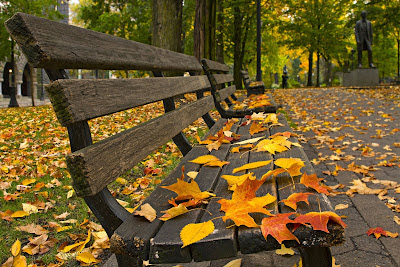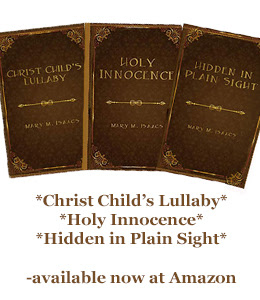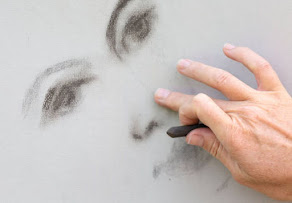Sunday, November 8, 2020
Corpus Christi
A short story by Mary M. Isaacs
It was another locked and deserted church. The young man walked up to the chain link fence and gripped the wire with his fingers. He looked up, gauging the height of the fence. Yes, he could probably climb over it fairly easily, but a heavy padlock on the double doors beyond showed how useless that effort would be. The dry leaves, dirt, and litter on the steps suggested that no one had attempted to get in for some time. There were faded shadows of graffiti, which had been scrubbed as clean as possible, but the doors and walls were forever scarred.
He wondered what it looked like inside. The windows had been broken and were now boarded up, but had the sanctity of the building been breached? Would the inside be destroyed too, vandalized like the outside? He hoped not but feared so.
He let go of the fence and dropped his arms. This was the third abandoned church he had seen that day—fourth, if you counted the burnt-out shell of a building he’d seen that morning. He couldn’t be certain that it had been a church, but there had been several clues… He felt sick at heart.
As he stood there, he had a vivid memory of going to church as a very young child. He went every Sunday with his grandparents when he visited with them in the summertime. The big brick downtown church—the cavernous interior, the fellowship hall filled with the older ladies for the women’s meetings he attended with his grandmother—he had been smiled over and patted, he’d been given milk and cake, he’d looked at the Bible scenes hanging on the walls. He went to Sunday school there, put his offerings into the basket, and sang Sunday school songs. He remembered the Bible stories, remembered them well. He had received story pamphlets and small Bible pictures and a certificate when he later completed communicants’ class. He could still recite the Lord’s Prayer and the Apostles’ Creed; they continued to comfort him during times of fear and distress.
He could not understand what had happened to it all. How had something that had been respected and loved, so quickly become something despised and maligned? He had a sudden thought and reached deep into his pocket. His fingers found something small and smooth, and he brought it out. It was a silvery cross; on it were incised the words, “God is Love”. He looked at it and then looked at the abandoned building. Where was that love now? Did anyone believe it any more?
Deeply disturbed, he turned back toward the motel where he had spent the night. He kept his eyes forward or on the ground in front of him, so he wouldn’t see the damaged and barricaded churches that he’d passed. He had started out that morning looking for a church to attend; at the end of the day, he was mourning their destruction.
He was so absorbed in his thoughts that he didn’t hear the sound of steps behind him until they had caught up with his. He turned his head to see an older man smiling gently at him. He gave a brief smile in return, but then looked ahead and kept on walking, the other man by his side.
“Why is a young man like yourself walking so slowly?” asked the older man. Then, peering closely, he added, “And why looking so dejected? It’s a beautiful day to be alive, isn’t it?”
The young man stopped abruptly and turned to face the other one. “I’ve been searching for a church—any church. I’ve been looking everywhere. Not just this city, but all over. Some are locked up, some are empty, some have been converted into homes or businesses. Some have even been burned or demolished,” the words poured out as the young man opened his heart. “I haven’t found one open church. It makes me sad—it’s all gone, everything’s gone. Where is God? Where is Jesus? I’m looking for them everywhere, but I can’t find them…” He put his hands over his face and wept.
The other man looked at him with compassion. After a few quiet moments, he said, “It’s been a long day for you, for both of us. I think we should sit down and have something to eat. Will you join me?” And he indicated a bench on the side of the road.
The young man took a deep breath. “I’m sorry,” he said, and then wiped off the tears with the heel of his hand. “Something to eat sounds good, thank you. I don’t have much with me right now, though—just some fruit and water.” After they both sat down on the bench, he opened his backpack and pulled out a paper napkin, which he spread between them. Reaching in again, he brought out a few apples, a bottle of water, and a cup.
“I have some bread,” said the other man. From a bag he carried, he brought out a small loaf of homemade bread.
While the young man watched, the older man raised the bread in his hands, prayed silently over it, and lowered it. He then broke off a piece of the loaf and held it out. Their eyes met briefly, one pair calm and the other pair startled.
The young man reached out slowly, as if in a dream; he took the piece of bread and brought it close to him, without taking his eyes off it. He held it in both hands, carefully and silently, while he bowed his head. Prayers and words and images swept through his mind: beatings and scourgings—”This is my body” –and the agony on the cross. Thunder and darkness, the shaking of the earth, heart-numbing grief–then the sudden radiance of glorious light, so blindingly real to him that he closed his eyes, only to realize that the light was everywhere, outside of him and within. All was illumined, he knew it all, and time stopped for a while…
Then the light slowly faded until once again he saw only the piece of bread in his hands. He raised it to his mouth and ate it slowly. Even though the blazing light had gone, he still felt its brilliance and warmth inside him. In deep surprise he raised his head to tell the older man what had happened.
But no one was there.
Mary M. Isaacs — copyright, 2020
(from a forthcoming book)
Subscribe to:
Post Comments (Atom)









No comments:
Post a Comment